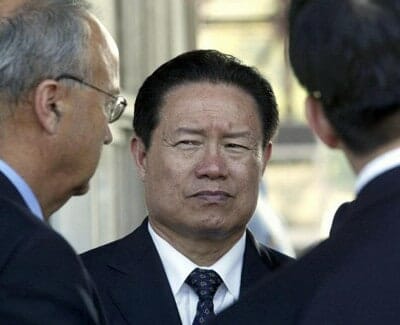China’s Xi government took down the biggest trophy to date in its campaign against corruption, and the fall of former politburo member Zhou Yongkang can be attributed in part to a pattern of using political influence to win lucrative business deals, especially in the property sector.
Zhou, who formerly served as China’s head of domestic security was said by the Communist party’s anticorruption agency yesterday to be under investigation “on suspicion of grave violations of discipline.” In the past, such investigations have led to trials, which customarily result in convictions in China’s party dominated legal system.
During his climb to the politburo and through his years in the top echelons of China’s party apparatus, Zhou and his family gained extensive holdings in companies in the real estate, petroleum, finance, tourism and infrastructure sectors. Zhou is the first current or former member of the Politburo to be accused of such breaches in party discipline.
Zhou Bin’s Real Estate Deals
Zhou Yongkang’s son, Zhou Bin appears to have profited the most from real estate opportunities from among the extended web of the fallen cadre’s relatives who gained company shareholdings or other assets during Zhou Yongkang’s reign. Zhou Bin and his extensive assets are also now said to be central to the party’s current investigation of Zhou.
Zhou Bin and his mother-in-law, Zhan Minli both have partnered with listed property developers on lucrative development projects. According to court documents and other filings, Zhou Bin and his wife’s mother both profited from partnerships with Hong Kong-listed Kaisa Group Holdings and Fantasia Holdings Group, which is listed on the same exchange.
Through an old college room-mate, Zhou Bin and his wife’s mother were said earlier this year to have illicitly won the rights to a 2,000-unit affordable housing project in Beijing. The room-mate was later jailed for corruption as well.
Zhou Yongkang’s nephew, Zhou Feng, is said to have been awarded the building materials contract for a RMB 700 million real estate project in Chengdu in 2010. Zhou Yongkang formerly was the governor of Sichuan province, of which Chengdu is the capital. Zhou Feng is said to have flipped that materials contract at a profit to a British company within two months of winning the rights.
Zhou Bin was detained as he was leaving Singapore for the US in December, according to a report in Reuters, and the wealthy investor in real estate and the oil industries is said to have lived in a multi-million dollar villa in Beijing. Before joining the party leadership, Zhou Yongkang had been an executive with China’s state-run petroleum company (CNPC), and Zhou Bin reportedly did most of his business in that sector.
Zhou Yongkang’s youngest brother, Zhou Yuanqing, was formerly the deputy director of a district land and resources bureau in Wuxi. Zhou Yuanqing has also now been detained for investigation.
Oil and Gas Assets and More
As a 30 year veteran of China’s oil and gas industry, Zhou Yongkang and his family seem to have profited more from their holdings in this industry even than from their real estate assets.
Zhou Bin, in addition to his real estate deals is majority owner of a Beijing company that sells equipment to companies his father formerly managed, and his mother-in-law owns companies selling natural gas to CNPC. Other relatives have benefitted from similar arrangements.
According to a report earlier this year in the New York Times, Zhou Bin, Zhan Minli and Zhou Yongkang’s sister-in-law hold or have controll of stakes in at least 37 companies in more than 12 provinces. The Times estimated the traceable assets of the Zhou family, including real estate to total at least RMB 1 billion, or more than $160 million.
The family is also thought to have extended overseas assets and other holdings not traceable through public records.
Real Estate Now Central to Several Corruption Cases
As Xi’s government goes through its much publicised anti-corruption campaign to purge the party ranks of naught officials, crooked real estate deals seem to be a recurring theme.
Late last month Guangzhou Party Secretary Wan Qingliang became one of the highest level Chinese officials to lose his job amidst the country’s current anti-corruption campaign, and China media sources have alleged that a history of dirty real estate deals may have led to Wan’s downfall.
Also this month, charges against a trio of Inner Mongolian officials accused of corruption included accusations of the illicit accumulation of vast real estate holdings.

Leave a Reply